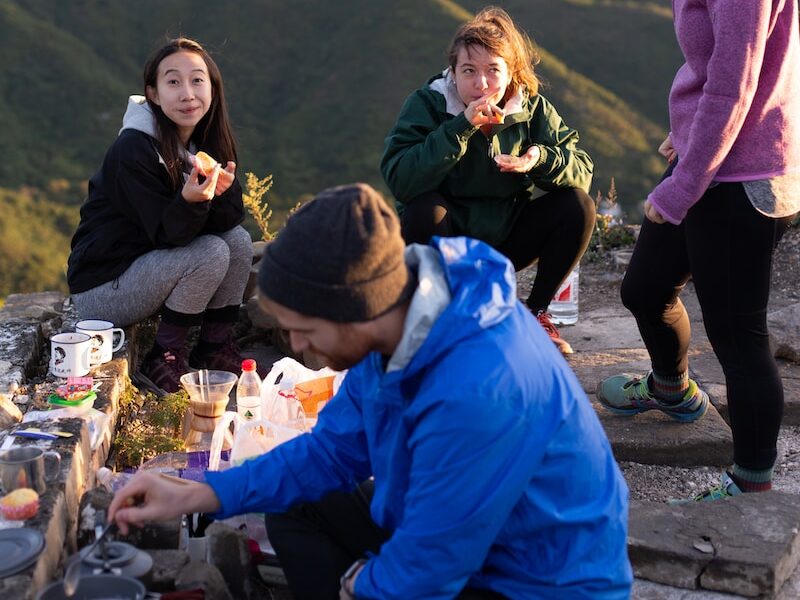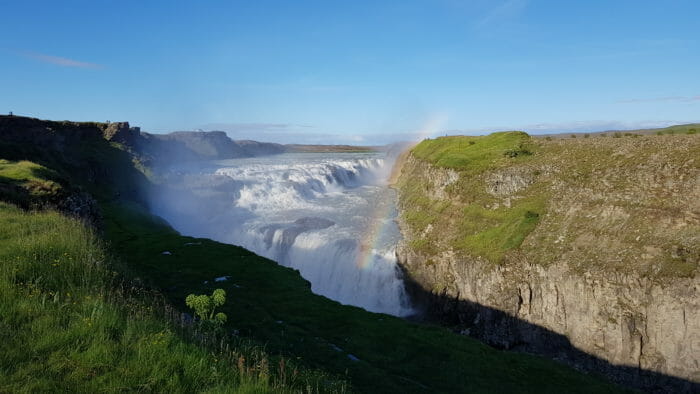Table of Contents
Introduction to Camping food without a fridge
Camping is an adventure that frees the soul. But what’s an adventure without some delicious food? When you’re out in the wild, you don’t have the luxury of a fridge. The importance of planning your meals cannot be stressed enough. It ensures that you have enough food that is both nutritious and easy to prepare. Plus, it saves you from the challenges of camping without a fridge.
Camping food without a fridge is not just about the ingredients; it’s also about how you prepare them. Cooking over an open fire or using a portable stove can add unique flavors to your food. Imagine waking up to the smell of freshly brewed coffee over a campfire or enjoying a hearty stew under the stars.
It’s important to consider the nutritional value of your meals. Engaging in outdoor activities requires energy, and your food is your fuel. Including a balance of carbohydrates, proteins, and fats is essential. Also, don’t forget to stay hydrated.
Planning is key. Before you set out on your camping trip, make a meal plan. Consider the number of days you’ll be camping and the amount of food you’ll need. Think about the cooking equipment you’ll have and the ingredients that will last without refrigeration.

Non-Perishable Food Essentials
When you don’t have a fridge, non-perishable foods are your best friends. These are foods that can last for a long time without spoiling. Not only do they save you from the worry of food going bad, but they also reduce the hassle of carrying heavy coolers. Let’s dive into the world of non-perishable foods and explore the options that can make your camping meals both delicious and hassle-free.
Tips for Using Non-Perishable Foods
- Rotate and Mix: Rotate between different types of canned goods, dried fruits, and grains to keep your meals diverse and exciting.
- Spice It Up: Bring along a selection of spices. They don’t take up much space and can dramatically change the taste of your meals.
- Safety First: Always check the integrity of canned goods. Don’t consume anything from cans that are dented, rusted, or bulging.
- Portion Control: Pack dried fruits and nuts in small, resealable bags. This will help in portion control and keep them fresh.
- Creative Combos: Experiment with combining different ingredients. For example, mix canned chicken with some spices and dried fruits for a Moroccan-inspired dish.
- Hydration: Some dried foods can be dehydrating, so make sure to drink plenty of water, especially if you are consuming salty canned goods or nuts.
- Cleanup: Remember to clean up and pack out all your trash, including cans, to leave no trace.
- Plan Ahead: Think about the meals you want to make ahead of time and make sure you have all the ingredients you need.
- Cooking Tools: Don’t forget essential cooking tools like a can opener, a pot for boiling water, and utensils.
- Share with Friends: If you’re camping in a group, share the responsibility of bringing different non-perishable items. This way, you’ll have a variety of foods to enjoy together.

Canned Goods
Canned goods are the superheroes of camping cuisine. They come in all shapes and sizes and can save the day when you are in need of a quick meal.
Beans
Canned beans are a staple. They are versatile and can be used in various recipes. From kidney beans to chickpeas, the options are endless. They are also packed with protein, which is essential when you are burning extra calories while hiking and exploring.
Vegetables
Canned vegetables like corn, peas, and carrots can add substance and nutrition to any meal. They can be eaten as is, or mixed into pasta or rice dishes.
Meats
Canned meats such as chicken, tuna, and even beef are excellent sources of protein. They can be used in sandwiches, salads, or even heated up for a warm meal.
Soups and Stews
Canned soups and stews are great for a quick and easy meal. They are especially comforting after a long day of outdoor activities. Just heat them up over a campfire or portable stove, and you have a warm, hearty meal.
Fruits
Canned fruits like pineapples, peaches, and mandarin oranges can be a sweet treat. They can be eaten alone or used in recipes like fruit salad.

Dried Fruits and Nuts
Dried fruits and nuts are the ultimate snack food for camping.
Energy Boost Bars
They’re light, don’t take up much space, and give you the energy you need for hiking and exploring. Nuts are packed with healthy fats and protein, while dried fruits provide a quick source of carbohydrates.
Custom Trail Mix
Mix them together for a custom trail mix. Combine almonds, walnuts, dried cranberries, and banana chips for a classic trail mix. Or get creative and add some dark chocolate chips or coconut flakes.
Adding Flavor to Meals
They are also great for adding flavor and nutrition to oatmeal or other grain dishes. Sprinkle some on your morning oatmeal along with a dash of cinnamon for a satisfying breakfast.
Homemade Energy Bars
Before your trip, you can also use dried fruits and nuts to make homemade energy bars. Blend dates, nuts, and a pinch of salt in a food processor, then press into a pan and refrigerate. Cut into bars and you have an easy, nutritious snack for your trip.

Grains and Pasta
Grains and pasta are excellent sources of carbohydrates, which you’ll need for energy during your camping adventures.
Instant Rice and Pasta
Instant rice and pasta are great options as they cook quickly. Bring along some instant noodles or couscous. They can be cooked in just a few minutes and can be mixed with canned vegetables and meats for a complete meal.
Bread and Crackers
Don’t forget about the basics like bread and crackers. They can be used for sandwiches or as a side for your meal.
Quinoa
Quinoa is another excellent grain to bring along. It’s packed with protein and is a great addition to salads or as a base for a stir-fry.

Fresh Food That Doesn’t Require Refrigeration
When camping, it’s a common misconception that you can only bring non-perishable foods. However, there are several fresh foods, particularly fruits and vegetables, that don’t require refrigeration and are perfect for a camping trip.
Vegetables
Certain vegetables don’t need refrigeration and can last for a few days. Potatoes, carrots, and bell peppers are great options. They can be used in stews, grilled over a campfire, or eaten raw in salads.
Potatoes
Potatoes are incredibly versatile and filling. You can wrap them in foil and cook them in the embers of your campfire for a delicious baked potato. Slice them up and cook them with some onions and spices for a tasty hash.
Carrots
Carrots are not only nutritious but also very durable. They can be eaten raw as a quick snack, shredded into a salad, or cooked in a stew.
Bell Peppers
Bell peppers add flavor and crunch to any dish. Stuff them with a mixture of rice, canned tomatoes, and spices, then cook them over the campfire for a delicious and healthy meal.
Tomatoes and Cucumbers
These don’t require refrigeration either and can be used in salads or sandwiches.

Fruits
Apples, oranges, and bananas are perfect as they don’t require refrigeration. They’re also packed with vitamins. Don’t forget about avocados; they are versatile and packed with healthy fats.
Apples
Apples are great for snacking and can also be used in cooking. Try slicing them and cooking them over the campfire with some cinnamon and sugar for a sweet treat.
Oranges
Oranges are not only delicious but also provide you with essential vitamin C. They are also very refreshing after a day in the outdoors.
Bananas
Bananas are a great energy booster. They can be eaten alone or sliced into oatmeal or peanut butter sandwiches.
Avocados
Avocados are a superfood and can be used in various ways. Make a simple guacamole or use them in salads or sandwiches.

Preparing Your Camping Meals
Campfire Cooking
There’s nothing like cooking over an open fire. It’s not just about the food; it’s an experience. Skewers are great for this. You can put meat, vegetables, or even bread on them. You can also wrap food in foil and cook it in the embers of the fire.
Grilling
Using a grill or grate over the campfire opens up even more options. You can grill burgers, hot dogs, or even make a classic grilled cheese sandwich.
Pot Cooking
Bringing a pot along can be very useful. You can make soups, stews, or even pasta right over the campfire.
Foil Packets
One of the easiest ways to cook over a campfire is by using foil packets. Simply place a combination of vegetables, meat, and spices in a piece of foil and fold it into a packet. Place it on the campfire and let it cook.

No-Cook Meals
Prepare salads or sandwiches. Use canned goods and fresh produce. It saves time and you don’t have to worry about starting a fire.
Salads
Use fresh vegetables like tomatoes, cucumbers, and bell peppers to make a salad. Add canned beans or tuna for protein.
Sandwiches
Sandwiches are a classic no-cook meal. Use a variety of deli meats, cheeses, and fresh veggies. For a twist, try making wraps instead.
Overnight Oats
Before you goto bed, mix oats with water or milk in a container. Add fruits, nuts, and a sweetener like honey or maple syrup. Let it sit overnight, and you have a ready-to-eat breakfast in the morning.
Snack Platter
Create a snack platter with a variety of cheeses, crackers, fresh fruits, and nuts. It’s a no-fuss option that’s both filling and satisfying.

Conclusion
Camping is an enriching experience that connects you with nature. The food you bring along plays a significant role in enhancing this experience. By choosing non-perishable food items and fresh produce that doesn’t require refrigeration, you can create delicious and nutritious meals. Whether you’re cooking over a campfire or preparing no-cook meals, the options are endless. So, pack your bags, gather your ingredients, and get ready for an unforgettable culinary adventure in the great outdoors.
Frequently Asked Questions
- What are some quick and easy camping recipes without using a fridge?
- You can make sandwiches, salads, or even a simple pasta dish with canned sauce.
- How can I keep food fresh without a fridge while camping?
- Use airtight containers and choose foods that naturally have a longer shelf life.
- Is it safe to eat canned food directly from the can while camping?
- Yes, as long as the can is not damaged or bulging, it is safe to eat directly from the can.
- What are some essential cooking tools to take camping?
- A portable stove, skewers for campfire cooking, a small cutting board, a knife, and a can opener are some essentials.
- Can I take dairy products camping without a fridge?
- It’s best to avoid dairy products as they can spoil easily. However, you can take hard cheeses like Parmesan which last longer.








